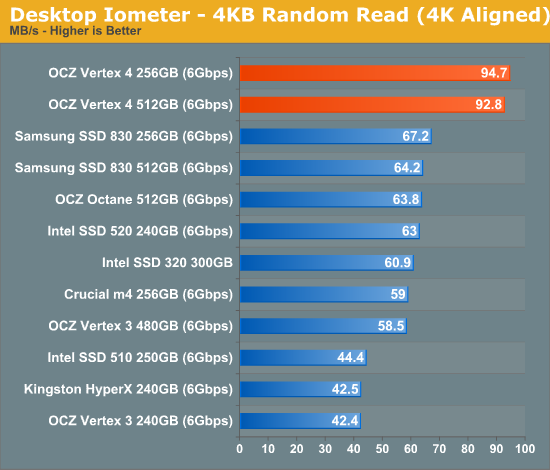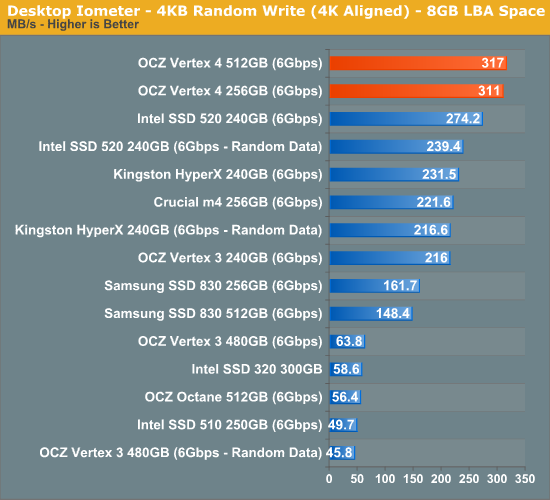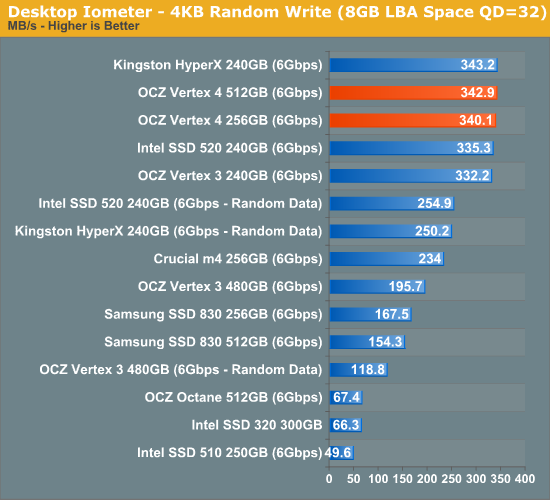OCZ Vertex 4 Review (256GB, 512GB)
by Anand Lal Shimpi on April 4, 2012 9:00 AM ESTRandom Read/Write Speed
The four corners of SSD performance are as follows: random read, random write, sequential read and sequential write speed. Random accesses are generally small in size, while sequential accesses tend to be larger and thus we have the four Iometer tests we use in all of our reviews.
Our first test writes 4KB in a completely random pattern over an 8GB space of the drive to simulate the sort of random access that you'd see on an OS drive (even this is more stressful than a normal desktop user would see). I perform three concurrent IOs and run the test for 3 minutes. The results reported are in average MB/s over the entire time. We use both standard pseudo randomly generated data for each write as well as fully random data to show you both the maximum and minimum performance offered by SandForce based drives in these tests. The average performance of SF drives will likely be somewhere in between the two values for each drive you see in the graphs. For an understanding of why this matters, read our original SandForce article.
Random read performance is staggering - a good 40% higher than anything else we've tested. While the cutoff for usefulness on a client drive is likely much lower than what even the Octane could deliver, this sort of performance bodes very well for OCZ's enterprise ambitions.
Randomly write performance is also just excellent. SandForce's peak numbers come close, but throw in any sort of incompressible data and they quickly take a step back while the Vertex 4 is able to deliver. Again, I'm actually more interested in these numbers from an enterprise workload standpoint but heavy client users will definitely not be disappointed.
Many of you have asked for random write performance at higher queue depths. What I have below is our 4KB random write test performed at a queue depth of 32 instead of 3. While the vast majority of desktop usage models experience queue depths of 0 - 5, higher depths are possible in heavy I/O (and multi-user) workloads:
SandForce always scaled well at higher queue depths, but again we're looking at best case performance for the SF-2281. Move towards incompressible data and the Vertex 4 is alone at the top.













127 Comments
View All Comments
Coup27 - Friday, April 6, 2012 - link
For the uneducated, what is a referral link?ginman - Wednesday, April 4, 2012 - link
I have been reading articles here for some number of years now and i like reading these. But i notice it's normally the same players, Intel, OCZ, Samsung, Crucial ect... I was wondering if there has been any benches run on the Mushkin SSD's, pricewise; they seem to be setting a new trend.InsaneScientist - Wednesday, April 4, 2012 - link
What's up with the connector on the opposite end of the board from the SATA connector? It looks like the same pinout as SATA, but smaller.Did I miss an interface specification?
And, more importantly: what's it for? 2 interfaces on one drive?
pc_void - Wednesday, April 4, 2012 - link
More like for sale ON amazon.Amazon itself isn't selling it atm.
And the prices are stupid.
sfroom - Wednesday, April 4, 2012 - link
I just reread the Samsung 830 review based on your comment in the last paragraph, but could barely find any mention of Mac use in the review. Why is the Samsung 830 your SSD of choice for Mac users?Additionally, I'd LOVE to see an article comparing the current batch of SSD's on the mac platform. Thanks!
ectoplasmosis - Wednesday, April 4, 2012 - link
I second this.ckryan - Wednesday, April 4, 2012 - link
The 830 pretty much works trouble free in OSX, with or without TRIM. It's garbage collection on post-CXM01B1Q FW is good, and performance got a bump with it too.Samplex - Thursday, April 5, 2012 - link
Why is this: "If you're buying an SSD today, our standarding recommendation (particularly for Mac users) is Samsung's SSD 830."Why is the Samsung better for mac users?
7Enigma - Thursday, April 5, 2012 - link
See here:http://www.anandtech.com/show/4863/the-samsung-ssd...
But as ckryan said above it comes down to garbage collection and TRIM support (or lackthereof).
iceman98343 - Thursday, April 5, 2012 - link
You can purchase the drive at amazon now - http://goo.gl/p8BSK